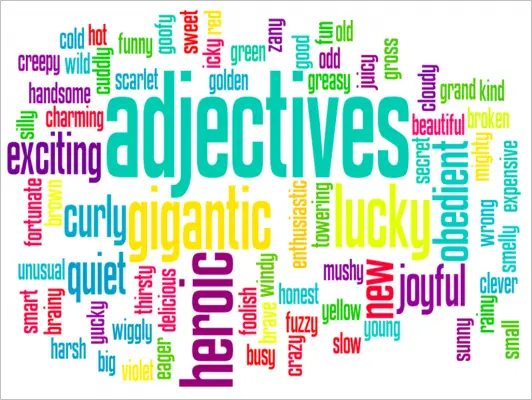If you’re looking for the best ESL adjectives games and activities, then you’re certainly in the right place. We’re going to give you the rundown on more than 20 top ESL adjective games and activities, along with worksheets, lesson plans and more.
An adjective is simply a word that describes or modifies a noun. Some of the most common ones include things like colors or words like big/small, hot/cold, hard/soft, etc. If you want to teach them the awesome way, then you’ll need to keep on reading to find out my top picks for ESL adjective games that can be used to describe nouns.
You can find adjectives in every single ESL textbook, from beginner to advanced. Instead of focusing on them exclusively, most textbooks sprinkle them in throughout. There are some fun ESL adjective games that you can try out if you want to spice things up a little bit in your classes.
Here are some of my favourite fun ESL activities and games for adjectives. Or, have a look at these Parts of Speech ESL Activities.
Adjective Games and Activities for ESL

ESL Adjective Activities and Games
Let’s get into the adjective activities ESL that you need for your classes.
#1 ESL Adjective Game: Flashcard Sentences
If you use a textbooks to teach kids, chances are that there are flashcards that go along with the book. Get your hands on these if possible because they are a very valuable teaching resource.
The way it works is that students have to take a look at the picture and then make a full sentence using that word. If correct, they get to keep the card. If incorrect, it goes to the bottom of the pile.
In this case, choose the cards with adjectives. Or, use the nouns but require that students include an adjective in the sentence too.
More details here: Using Flashcards in your ESL Classroom.
#2: Dialogue Substitution
There is often a reading to introduce a unit. In this case, you may find one that’s filled with adjectives and wish to make better use of it than just simply having students read it together with a partner or by themselves.
To do dialogue substitution, leave some of the words blank (adjectives or nouns in this case) and then have a word bank that students can use to fill in the blanks. It turns this kind of mindless activity into something far more useful because students also have to focus on meaning, and not just simply reading.
Check it out here: Dialogue Substitution.
- Amazon Kindle Edition
- Bolen, Jackie (Author)
- English (Publication Language)
- 112 Pages - 10/24/2019 (Publication Date)
#3: Picture Prompt Warmer
A nice way to introduce a topic or set of vocabulary is to find a related picture. In this case, you’d want to ensure that there are a lot of possible adjectives that students can see. Then, elicit some words that students know.
Instead of just the noun, encourage students to add an adjective. For example:
dog—>a brown dog
building—>a tall building
Find out more about this popular ESL adjective activity here: Picture Prompt Warm-Up.
#4 ESL Adjectives Game: Taboo
Chances are that you’ve played taboo at a party of some kind. Basically, you have to get your team to say a specific word but you can’t use other, related words. It’s a fun party game!
In this case, you’d want to use adjectives. It can take a bit of time to set this up so it’s usually only worth it if you can use it for multiple classes. But, the effort is worth it because it’s a fun way to spend an English class!
More information here: ESL Taboo.
You could also consider using this one for comparatives and superlatives. It’s a fun way to get students to try to guess the correct adjective. More ideas here: ESL Comparative and Superlative Games and Activities.
#5 ESL Adjective Games: Disappearing Sentence
If you have just a minute or two before the end of the class, consider using this filler that also makes quite a good review activity.
Write a sentence on the board related to what you’ve been teaching. For example:
“The large, brown cat and the tiny black dog like to take long walks by the river.”
Then, erase 2-3 words at a time and students still have to say the sentence. By the end, there will be no words left but students will have memorized the sentence.
Learn more here: Disappearing Sentence ESL Game.
#6: Dictation Practice
#7: Incorporate Adjectives into your Daily Routine
It’s ideal to have a routine to start your class off, no matter what age you teach. This is especially important with little kids as they know what to expect and it just gets things going more smoothly.
You might want to start your day off with something like the following:
- Good morning, how are you?
- What day of the week is it?
- How’s the weather today?
- Look out the window. What do you see (include adjectives here)
- Review specific adjectives (big/tall/short, etc.)
More information about doing this in your classes here: Daily Routine for ESL Classes.
#8 ESL Adjectives Games: Dictogloss
This is a classic ESL activity because it focuses on a wide variety of skills at the same time. The way it works is that you find a reading passage (or write your own). In this case, it’d be heavy on the adjectives.
Then, you read it out at a normal pace and students have to work in pairs to recreate what they just heard. Ideally, they’d understand about 50% of it. Read the story again and students add more information. Finally, they compare their version to yours at the end.
Find out the details here: Dictogloss ESL Activity.
#9: ESL Clothing Quiz
Try out this simple clothes quiz with your students. It’s filled with a variety of adjectives!
#10 ESL Adjective Activity: Draw a Picture
This is one of my favourite activities for units directly related to adjectives to describe people. The way it works is that students sit back to back. One student has a picture (of a person) and has to describe to their partner what they see. This person has to draw it.
It’s a simple activity that students love! Check it out here:
ESL Adjective Activity for People.
#11 Interactive Adjective Games: Flip-Chart Vocabulary Review Game
If you’re looking for a quick, but fun ESL review game that’s ideal for adjectives, then consider Flip-Chart. The way it works is that one students sits at the front of the class and you stand behind them with a flip-chart with words on it.
Their team has to give them hints about the word and the person sitting in the chair has to guess what it is. The team with the most points at the end of the allotted time is the winner.
Check it out here: Vocab Review Game.
#12: Got to Hand it to You
If you’re looking for an ideal way to review adjectives, then you’ll want to check out this activity. It’s kind of like ESL Jeopardy, but it’s far more student-centred. Find out more details here: Got to Hand it to You Review Game.
#13: Comparative Adjective Quiz
#14: Role-Plays
If you teach English to beginners, then you’ll certainly want to consider using this role-play activity. The way it works is that you give students the start of a conversation, but with some blanks in it. Of course, you’ll want to make the conversation so that it lends itself to using lots of adjectives!
Then in pairs, students have to work together with a partner to fill in the blanks and complete the conversation. After that, they can perform their short conversation in front of the class.
If you want to give this beginner-level ESL activity a try, find out more about it: ESL Role-Plays.
#15: Board Games
I love to play board games in real life which is perhaps why I like to use them in my English classes too. It’s easy to design them for just about any topic, grammar point or vocabulary set. Plus, the students love to play them!
In this case, you might fill the board with questions that would require students to use adjectives in their answers. Maybe they could describe things around the classroom. It’s up to you but I’ve definitely use board games for teaching adjectives quite successfully in the past. Learn more here: ESL Board Game Activity.
#16: Typhoon
Try out this fun quiz game that can be used to review just about anything, including adjectives! Find out everything you need to know here:
#17: Running Dictation
This is one of my favourite ESL games for a number of reasons. It’s:
- Student-centred to the max
- Fun and students like it
- Can be used for just about any topic
- Gets students out of their seats and moving around the class
- Uses a variety of skills in a single activity.
The way it works is that you can post bits of a conversation around the class. Of course, use lots of adjectives in it! Then, students have to work together to dictate the conversation. Once that’s done, they can order the sentences they have to make a coherent conversation. Try it out today: Running Dictation Game.
#18: Telephone
I’m sure you played this game when you were a kid. The way it works is that you have to pass a sentence down the line and then find out what you have at the end. Comparing it to the original usually yields some hilarious results! You can use it for any sort of vocabulary. Learn more about it: ESL Telephone Game.
#19: I’m an Alien
If you want to elicit a bunch of adjectives, there’s almost no better way than with, “I’m an Alien.” Find out more about it here:
#20: What are you Cooking?
This is a fun, food-related activity to try out with your students. The way it works is that students have to design a 3-course meal based on an ingredient list from another team.
Then, they have to convince the class that they have the most delicious meal. Hence, the heavy adjective use! Check out the details for yourself: What are you Cooking?
- Amazon Kindle Edition
- Bolen, Jackie (Author)
- English (Publication Language)
- 211 Pages - 07/12/2020 (Publication Date)
#21: Whiteboard Race for Teaching Adjectives
This is one of the best, simple adjective activities to try out with your students. Make up a number of teams, depending on the amount of whiteboard space you have. Then, 1 person from each comes to the board and takes a marker. Say a word and the first person to write down an adjective gets a point for their team.
For example, if you say person, students could write kind, funny, smart, etc. If you say a house, student could write big, cozy or comfortable.
I write down the winning adjective on the side of the board and students can’t use it again which makes this game more interesting. Keep playing until everyone has had a chance.
More ideas here: ESL Whiteboard Activities and Games.
#22: A-Z Alphabet Game
Unless you teach absolute beginners, it’s likely that your students already know a fair few adjectives. This makes a nice warmer activity to help students activate their prior knowledge before jumping into the new stuff:
#23: Hot Potato Adjectives ESL Activity
I’m sure you’ve played the hot potato game before. The way it works is that you pass around a potato (or another small object) and if you drop it when passing, you’re out. Or, if the music stops and you’re holding it, you’re also out. It’s easy to use this is an ESL game too.
The person holding the object has to do something when the music stops. In this case, it’s use some adjectives to describe something. Beginners may just to have to use word to describe an object (sweater-soft) while more advanced learners can use more (classroom-sterile, hot, boring).

Fun ESL Adjective Games and Activities
#24: Choose your Own Adventure Group Writing Activity
Adventure stories are the perfect opportunity to practice using lots of interesting adjectives. And this group writing activity is certainly a good one. It’s interactive, engaging and students from children to teens to adults usually love doing it.
It does take a while to set up and organize but it’s usually worth it when you see the results! Find out how to do it here: Choose your Own Adventure Writing Activity.
#25: Postcards
Any postcard is made way better with adjectives! Have a look at this simple writing activity:
#26: Fives Senses Writing or Speaking Activity
Check out this writing or speaking activity that can be done alone or in groups. Choose a common object like an apple and bring it into class. Then, students have to think of some words that can describe that object. It’s fun to do this over the course of a semester a few different times with different objects.
Find out more about it: Five Senses Speaking/Writing Activity.
#27: ESL Fruits and Vegetables Quiz
Check out this fun online quiz that uses adjectives to give hints about a secret fruit or vegetable. Students can pick out the adjective in each hint.
What is an Adjective?
An adjective is a word that describes or modifies other words. They can help make writing and speaking more specific and interesting. Both beginners and more advanced English speakers can use a variety of them. Some examples of adjectives are words like big, green, and pointy.
What are the Types of Adjectives?
There are some different types of adjectives to be aware of. They include the following:
- Descriptive (colors, sizes, etc.)
- Possessive (my, your, etc.)
- Demonstrative (this, that, etc.)
- Interrogative (which, what)
- Indefinite (some, many, a few, etc.)

Different kinds of English adjectives
Tips for Teaching Adjectives
Are you looking for some tips and tricks teaching adjectives ESL? Do you want to know how to teach adjectives? Then look no further than this quick list!
- Remember to keep things student-centred. This means that you should be talking less, and your students talking more!
- Review is key. Students to have to see and use things at much as possible for them to actually remember. Sure, they can study at home, but chances are they won’t, so help them out in class!
- Less is more. It’s better for students to know a few adjectives really well and be able to use them correctly, rather than a list of 100+ adjectives and only kind of know them. Keep this in mind when planning your lessons.
- Show, don’t tell. One of the ways to make language memorable is to show students instead of just telling. If you’re explaining brilliant, show them a brilliant blue, and then a dull one. They’ll never forget it.
- Know the different types of adjectives (descriptive, comparative, superlative, positive).
- Don’t forget pronunciation. This is a key part of the lesson when introducing new vocabulary.
Do you have any tips or ideas for how to teach adjectives? Leave a comment below and let us know! We’ll add your idea to this list.
- Amazon Kindle Edition
- Bolen, Jackie (Author)
- English (Publication Language)
- 98 Pages - 11/07/2020 (Publication Date)
How do you Make Teaching Adjectives More Fun?
The key to make teaching adjectives more fun is to use a variety of interesting and engaging activities and games such as board games, surveys, videos and more. Then, also consider some worksheets, controlled practice, freer practice, along with homework to reinforce key concepts with adjectives.
What about Online Practice for Adjectives?
If you’re looking for some sources for online practice for adjectives for your students, then these games and activities probably aren’t what you’re looking for. But, not to worry!
Here are some of my favourite resources for online adjective games that you’ll want to recommend to your students:
What about ESL Adjective Worksheets?
If you’re looking for something to do in class besides these adjective games ESL, then consider using some of these worksheets. They’re an ideal way to give your students some practice with the forms and specifics of how to use adjectives in the English language.
You could also print off some of these and give them to your students for homework. Either way, they’ll get some extra adjective practice which basically equals some ESL teaching awesome!
What about an ESL Adjective List?
As you may have noticed, we don’t actually list the most common adjectives here. Instead, we prefer to point people to the following resources, depending on the level and needs of your students:
List of Adjectives by Category (emotions, personality, etc.)
The thing to keep in mind with these resources is that less is often more. I’d rather my students know 50 of the most common adjectives down cold and be able to use them in conversation rather than they know 500 of them only vaguely and not well enough to use them.

ESL adjectives games
What are the Most Common English Adjectives?
However, if you want a list, then here are the most common 25 adjectives that all English learners should know:
- good
- bad
- first
- last
- long
- short
- tall
- new
- old
- young
- big
- little
- high
- low
- early
- late
- important
- same
- different
- able
- few
- many
- next
- right
- wrong
Do you want to get more organized? Check out our recommendations here: Tote Bags for Teachers.
Did you Like these ESL Adjective Activities and Games?
- Amazon Kindle Edition
- Bolen, Jackie (Author)
- English (Publication Language)
- 187 Pages - 03/09/2016 (Publication Date)
Yes? Thought so! Then you’re going to love this book over on Amazon: 101 ESL Activities for Teenagers and Adults. The key to happy, engaged students who love coming to your classes to learn English is a wide variety of interesting games and activities. And this book will help you do just that.
Well-Organized and Easy to Use
There are enough ESL activities to get you through an entire semester or course in style. And the best part is that the book is well-organized into various sections: reading, writing, speaking, listening, grammar, review, etc. so that you should be able to find what you’re looking for in a minute or two. Yes, it really is that easy to have better English lessons.
Available in Two Formats
You can get the book in both digital and print formats. Keep the physical copy on the bookshelf in your office and use it a handy reference guide when doing your lesson planning. Or, take the e-version with you to your favourite coffee shop for lesson plans on the go.
Get your Copy Today
Does it sound like exactly what you need to get some excitement back into your ESL classes? Then head over to Amazon to check it out for yourself. But, only if you want to get yourself a serious dose of ESL teaching awesome in your life:
Have your Say about ESL Adjective Games
What are your thoughts about this list of activities, online practice and worksheets to help your students learn more about English adjectives? Do you have any favourite ESL adjective games? Leave a comment below and let us know what you think. We’d love to hear from you.
Also be sure to give this article a share on Facebook, Pinterest, or Twitter. It’ll help other busy English teachers, like yourself find this useful teaching resource.

ESL Adjectives
Last update on 2025-04-09 / Affiliate links / Images from Amazon Product Advertising API










I honestly struggle with how to make these kind of dry grammar and vocabulary units in my textbook more interesting but ran across your site. Lots of nice tips and ideas!